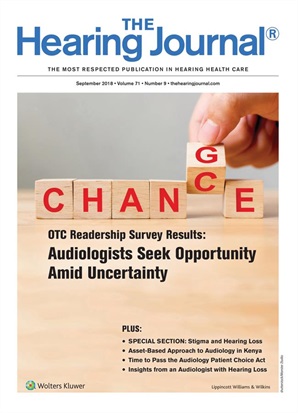
Melanie Brand was a good swimmer who wore hearing aids for severe hearing loss. When she requested swimming for gym class in high school, the coach refused and reasoned that Melanie would not be able to hear his instructions. “Put me fifth in line, and I will follow the people ahead of me,” she responded. It was not until Melanie’s father requested a meeting with the guidance counselor that the coach finally conceded. Melanie went on to do well in her swimming class. However, 50 years later, she still feels angry and frustrated by that memory.
Hearing health care professionals may believe that stigma no longer deters people with hearing loss from seeking care. However, Melanie’s story is similar to countless others that we have heard from patients and audiologists across the country over the past three years while presenting the workshop, “Taking the Sting out of Stigma.”
Research supports that societal stigma against hearing loss may prevent patients from taking the first step of visiting a hearing care professional. In the MarkeTrak IX Consumer Study conducted by the Hearing Industries Association in 2014, the most often-cited reason for not pursuing hearing care was “can hear well enough” by 51 percent of respondents with self-identified hearing loss (respondents were able to select multiple reasons; see chart here).
Stigma-related issues were also predominant, garnering all 64 points. Twenty-one percent of respondents described hearing aids as “too embarrassing,” 15 percent selected “unattractive,” 14 percent claimed that the hearing aids were “too noticeable,” and 14 percent felt that they were “too young” to wear hearing aids. Cost concerns also played a key role in patients’ decisions to not seek help. The reasons “it’s too expensive,” “cannot afford,” and “no coverage” totaled 94 points.
Patients’ lack of engagement with hearing care also surfaced in the responses. In addition to the number one answer of “can hear well enough,” 25 percent noted that they “have other, more serious priorities.” This lack of engagement from addressing hearing loss potentially stems in part from the fear of societal stigma.
In our experience, the impact of stigma looms large, and incorporating stigma counseling into audiology practices is beneficial to patients and clinicians. To address patients’ issues related to stigma, it’s critical to understand the pervasive nature of stigma and employ tested strategies and tools.

Leave A Comment